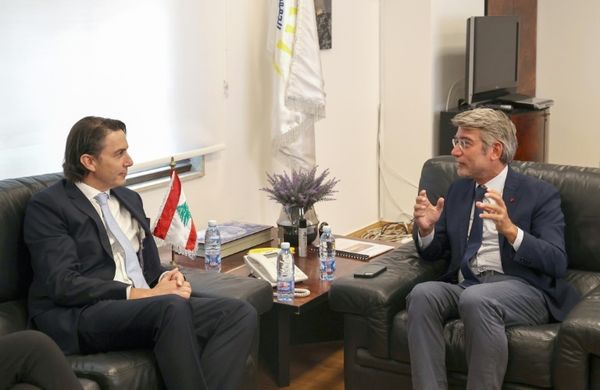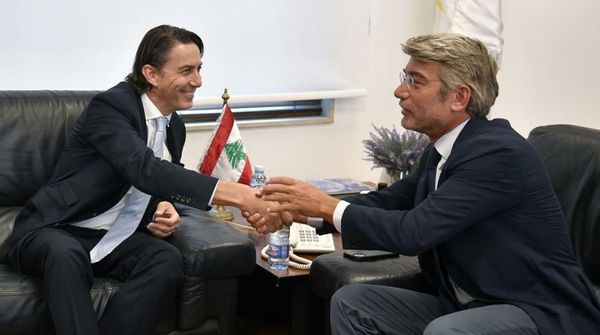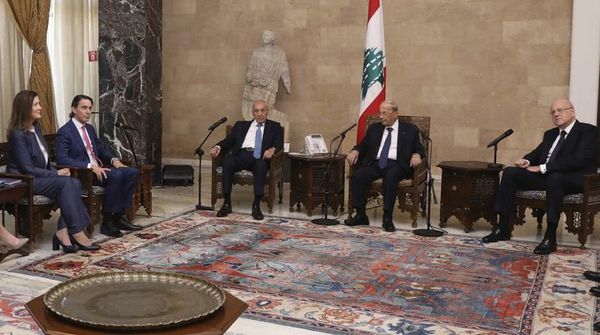
Beirut (AFP) - A US envoy on Monday expressed optimism that Lebanon and Israel could move towards a maritime border deal to settle competing claims over offshore gas fields.
The dispute escalated in early June after Israel moved a production vessel near the Karish offshore field, which is partly claimed by neighbour Lebanon.
This prompted Beirut to call for the resumption of US-mediated negotiations on the demarcation dispute.
"I remain optimistic that we can make continuous progress as we have over the last several weeks and I look forward to coming back to the region and being able to make the final arrangements," envoy Amos Hochstein told reporters after meeting Lebanon's top leaders.
Hochstein, on his second visit in less than two months, is carrying an Israeli proposal in response to a demarcation offer made by Lebanon, where officials also expressed optimism over a potential deal.
On Monday, he met with President Michel Aoun, Prime Minister Najib Mikati and parliament speaker Nabih Berri at the presidential palace.
He also met separately with caretaker Foreign Minister Abdallah Bou Habib who called the progress in talks "potentially exceptional".
"Negotiations are still ongoing, and they have almost reached their conclusion," Bou Habib told a local broadcaster after the meeting.
Parliament's deputy speaker Elias Bou Saab who attended Monday's meeting called the talks "positive".
"The gap...has narrowed, and the time period separating us from the return of the American mediator to Beirut will be short," he said, quoted in a statement issued by the presidency.
"God willing, we will see results in the next few weeks," added Bou Saab, tasked by the president with following up on negotiations.
Qana field
Lebanon and Israel, whose border is UN-patrolled, have no diplomatic relations.
They had resumed maritime border negotiations in 2020 but the process was stalled by Beirut's claim that the map used by the United Nations in the talks needed modifying.
Lebanon initially demanded 860 square kilometres (330 square miles) in the disputed maritime area but then asked for an additional 1,430 square kilometres, including part of the Karish field.
Israel claims the field lies in its waters and is not part of the disputed area subject to ongoing negotiations.
A Lebanese official in mid-June said Beirut had made a new offer to Hochstein, holding back on demands for territory where Israel planned to imminently extract gas.
Beirut was pushing for the country's maritime border to exclude Karish and include the whole of a nearby field instead, the official told AFP at the time.
An Israeli official on Sunday said Israel's offer on the original disputed zones was a "compromise to both sides" and would allow Lebanon to develop "the Sidon reservoir", known as the Qana field, while safeguarding Israel's interests.
After meeting Hochstein, Lebanon's foreign minister said his country was demanding the right to develop "all of Qana", without concessions.
'Pay dearly'
On July 2, Israel said it had downed three drones launched by Lebanon's Iran-backed Hezbollah that were headed towards the Karish gas field.
The Iran-backed Shiite Muslim movement on Sunday released a short video it said showed surveillance of several Israeli-chartered energy infrastructure ships.
Hezbollah's chief Hassan Nasrallah had threatened attacks if Israel proceeds with gas exploration in the disputed area.
On Sunday, Nasrallah said Hezbollah will determine its next step based on the outcomes of the latest talks.
"We're paying no attention to Nasrallah's threats," Ram Ben Barak, head of the Israeli foreign and defence committee told public broadcaster Kan radio on Monday.
"But if Nasrallah dares to do anything to Israel's gas rigs, Lebanon –- and Hezbollah -– will pay dearly."
Israel and Hezbollah last fought a devastating war in 2006.










